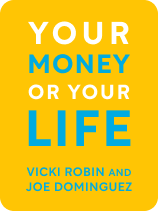

This article is an excerpt from the Shortform book guide to "Your Money or Your Life" by Vicki Robin and Joe Dominguez. Shortform has the world's best summaries and analyses of books you should be reading.
Like this article? Sign up for a free trial here .
Have you thought about what money means to you? How does your definition of money impact your life?
People think about money in four basic ways. One of these four stands apart as the most useful because of its consistency. What money means to you makes a difference in how you live your life.
Read more to learn what money means.
What Money Means to Different People
There are four basic ways people think about money:
- It’s a material—literally the bills, plastic, or transaction that allows for the purchasing of goods.
- It’s a reflection of our psychology, embodying our dreams and fears. How you spend money can reflect your personality, whether you’re a penny-pincher or like to spend liberally.
- It’s a reflection of our culture: thinking that “more is better” and that we have a role in growing the economy.
- It’s “life energy”—we are willing to dedicate our time and energy in exchange for money. This is the most useful definition of money because it’s consistent in most situations.
Defining money as life energy allows us to make statements like, “I invested eight hours of my life to pay for this pair of shoes”—we can see exactly how much time and energy goes into each purchase.
Your life has a finite number of hours. In general, you can assume that half of the hours remaining in your life will be filled with doing basic body-related things: sleeping, eating, exercising, and more. That leaves the other half to squeeze in work and everything else that matters to you, like spending time with family.
You can see how it’s helpful to think about what money means.
Escaping the Money Game
Like it or not, regardless of what money means to us, we are all part of the money game—the buying and selling of goods and services. We need some to survive, but advertisements encourage us to consume things beyond the basic necessities. For example, you might be convinced to upgrade your phone even when you have a functional one.
In addition, there are some economic indicators that force us to keep playing:
- Inflation
- Cost of living
- Recession and depression
We’ve been trained to be sensitive to these kinds of economic indicators. If we’re told something is off, we respond accordingly. Here are some examples:
- If we hear that a recession is imminent, we might decide to forgo taking a vacation that year, despite having a stable job and plenty of savings.
- If the news says that the cost of living in our area has increased, it makes us feel poorer, playing off of our existing concerns about money. However, the consumer price index, which is used to evaluate cost of living, continues to add items that were once considered luxuries, like cell phones. We’re expected to need more things, even if our earnings haven’t risen to match.
The money game’s ability to keep us spending isn’t unlike the premise of the popular film, The Matrix. In the movie, machines pacify humans through a simulated reality and use human energy to power themselves. The main character, Neo, is offered a “red pill” to be able to see this reality.
Think again about what money means. Understanding that money is life energy is like taking the red pill. You learn to:
- Identify what you need, rather than being convinced to squander your money or time.
- Reflect on your spending, and decide if you would spend differently in the future.
You can’t decide whether or not to play the game, but you can make more cognizant decisions about when to play. In some instances, you might realize that spending money isn’t the best way to satisfy your needs or the needs of others. Instead, you can make use of other resources at your disposal, such as affection or expertise.
When you think through what money means, you can make more informed decisions.

———End of Preview———
Like what you just read? Read the rest of the world's best book summary and analysis of Vicki Robin and Joe Dominguez's "Your Money or Your Life" at Shortform .
Here's what you'll find in our full Your Money or Your Life summary :
- The 9 steps to reach financial independence
- How to change your entire relationship with money and live a more meaningful life
- How to align your spending habits with your values, purpose, and dreams






